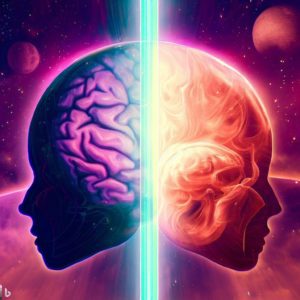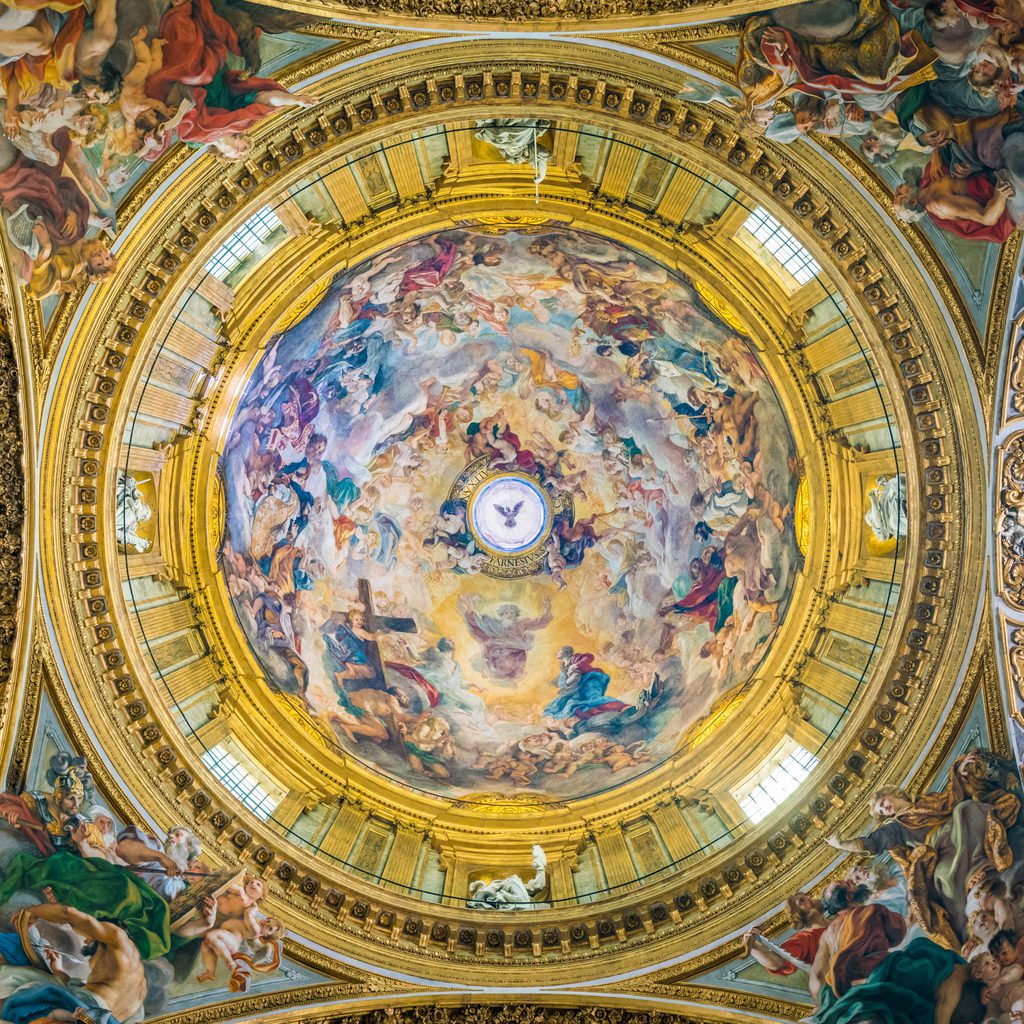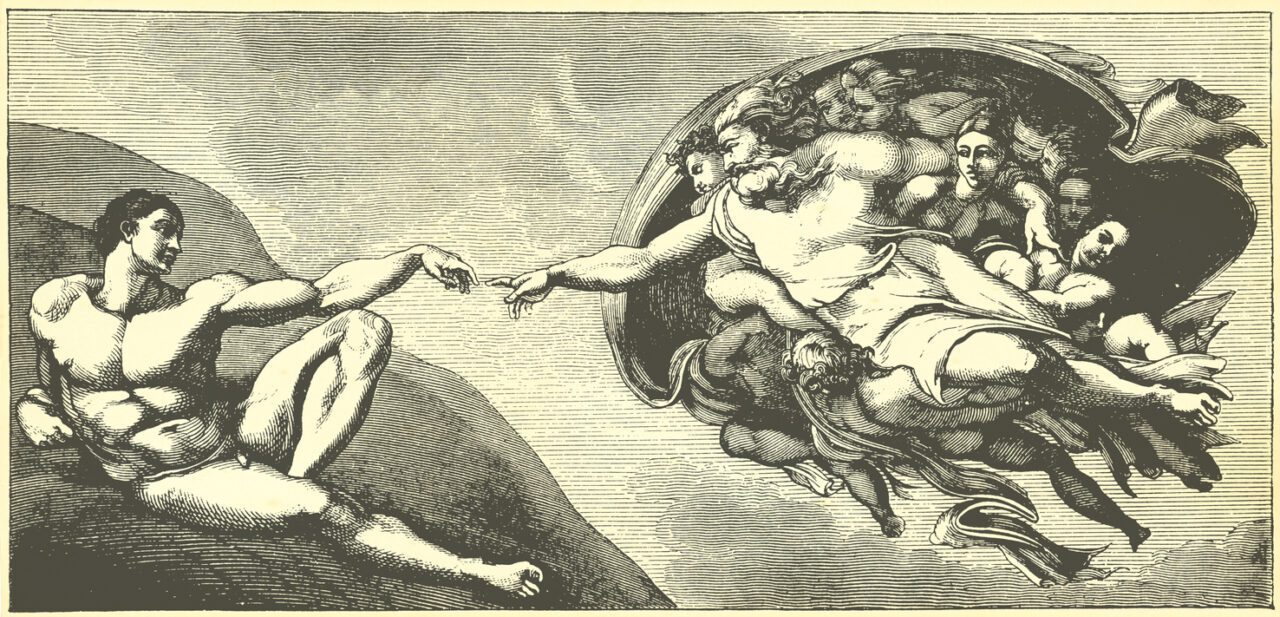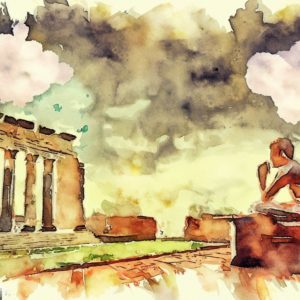I still wanted to work on explaining the entirety of exactly what I just said, the title and the under- heading title, whatever that’s called, of this podcast, and specifically right now I want to talk briefly on Logos.
What does Logos mean and in what method or manner am I using logos and what that means for and towards this podcast.
So, there is a technical term for logos. I think the way it’s said in Greek or Latin or something like that is logoi, logoi. I don’t know. I’m not a linguist. I never got into any of that kind of stuff even though I probably should have at some point. I bought some Greek and Latin stuff to hopefully learn it at some point, but I just haven’t gotten around to it. But the way to look at it is: biology, right? Theology, philosophy. The ending of that is the translated version of logoi, which is the translated version of logos. That’s more of the technical term of logoi. I think it means something more like the knowledge of this or learning the knowledge of XYZ or teaching of God, right, theology or the logos of God in theology, the knowledge of God, something like that is kind of what it means in a more technical term.
I don’t know, I don’t really care what that means. That’s why I can’t really explain it. I’ve been more interested in logos being the Word. Logos. . .it’s not used as often in church, in biblical studies since the focus is more on the Word of God, right, in the opening of John’s gospel, right, “In the beginning was the Word and the Word was with God.” That’s what I mean by logos. The second person of the Trinity, the logos, the mind of God.
Now, why is this important? It’s important because understanding this, at least for me, and at least for I think somebody that really wants to get past the struggles that exist in religion is that it helps one gets past theology, essentially. Theology. . . theologians. . . is just this like back and forth, the bickering and fighting and no, I’m right, you’re right, you were right 500 years ago but I’m right now, and they were right 1500 years ago and nobody’s right now, and this is what it was then and that’s not what it can be now, but this is what it is now. . . and back and forth. It’s just like this endless thing of trying to understand it. And that’s if you’re doing it in some kind of a scholarly fashion but then once you start trying to apply these things to yourself it gets really frustrating.
So, in my book, “Lucifer Revealed,” if you haven’t read it or you don’t understand what it is, I’m not very good at explaining what it is because it’s a very difficult thing to explain what it is. It’s about the angel that’s guarding the Gates of Eden, awakening to himself, and realizing that he’s been standing there guarding this like a soldier at a post and he wants to get out of there because he doesn’t know what he’s doing in there. And he goes off on this adventure and quest and his old best friend used to be Lucifer and he’s trying to figure out what’s happened in the universe since he’s been in Eden guarding this gate. So, as you can imagine, he knows nothing of what’s going on since he’s been guarding this gate.
So, that’s the gist of it, but in essence the writing within it is my trying to get past the problem of evil since the problem of evil, as I imagine many people, it’s a huge problem when it comes to is God real, why should I believe in God, why do I go to church, why does God let these things happen, why does it seem like evil succeeds and good fails? Is there evil and good, right? I mean, that’s when you even get to the nitty gritty of it. It’s the frustration that comes from that. When you read the Book of Job and you’re like, that’s like, horrible what happened in there? How could I still worship a God that allows that to happen? Or when you get into the, why am I worshipping this God that decimates cities when you go into the Old Testament or, you know, turns women into salt? Right? And stuff like that. It’s like, what am I doing this for and that’s why I can totally see the atheist standpoint of just like, “dude you guys are you know, bonkers for believing in this. I mean, how can you even reconcile this kind of stuff? And you know, that’s the point is you can’t. It’s impossible. Not only is it what you’re reading or studying that somebody else was trying to contemplate, because that’s essentially what that person who wrote the Book of Job, for instance, was doing. They were trying to understand the problem of evil and they wrote this whole thing about it. And you know, it doesn’t mean that they succeeded for everybody else. It seems like they succeeded for themselves, but that’s the problem with it, right, is it’s not just what you’re being taught, it’s do I accept it, do I understand it, is that what I want to see and know and understand and that kind of stuff?
So, as long as you’re mired in this, as long as you’re in the muck of this and this is essentially the left or the right path. This is the wide-open path. This is where you’re focused on these things because they’re important or you’re being told they’re important or you’re being told they’re important so that they are stumbling blocks to keep you locked in the mentality of this. And as you can see, this problem of evil, the basic concept of it, good and evil, binary, this dualistic nature of the left or the right, especially for Americans. . . absolutely permeates our country.
I gave a pause there, just so that you understand what I’m talking about because you know what I’m talking about. I’m not going to get into politics or anything like that, but that’s literally the foundation of this country right now. Not sure if it was always like that. I have to really dig into my mind to see that kind of stuff in American history, but that is most definitely what exists right now, the dual nature of this binary, essential, civil war that is occurring in the social strata of Americana right now in the left or the right. And that is rooted in the whole problem of evil and theology as well.
And I spent I don’t know how many years sitting there trying to wrap my head around this, trying to wrap my head around the left or the right, the good or the evil. And it got me nowhere. . . absolutely nowhere, because there is just no logical way of reconciling this with God. I love the explanation of this or the dialogue of this in the Batman versus Superman movie when Lex Luthor is trying to . . . I mean, obviously he’s comparing Superman to the real, to God, right? This is the real God, this kind of being that comes from the sky and he’s all powerful. He explains you know, “If God is all good, He can’t be all powerful and if He’s all powerful, then He can’t be all good,” because why does bad stuff happened is the gist of what I’m talking about here.
As long as you’re infused in this, as long as you are trapped in this, and I say trapped because that’s how I felt, I felt like I was utterly trapped in thinking about this and trying to wrap my head around this and I just could not get past it . . . until I started to focus on understanding Christ, the Logos. And understanding not the physical Christ, Jesus . . . not Jesus the man, the Son of God, but the Christ, the second person of the Trinity and what that means and stands for, and not just in terms of the theological aspect of it, but in how that relates to me personally.
It doesn’t mean I don’t care about good or evil. It doesn’t mean I don’t care about these kinds of things. But you don’t find peace in that, and if you’re trying to find peace, inner peace, inner tranquility of the mind, then you have to get past that.
Now, in the esoteric stuff this is what is called mental alchemy. You’re neutralizing either the left or the right with the left or the right and the overall goal is to get to some type of equilibrium, some middle point and that middle point would be translated as the narrow path in how Jesus describes it, right? There’s this left, there’s this right, there’s this wide-open path. Few find the narrow path, and that is the path that one has to walk to get to understanding Logos, Christ, the Word. That is why it is important.
So, Logos is not logo-making. I probably should put that in the front of this, but logos. . . I’m not referring to making a logo, so hopefully nobody clicked on this looking for what is making a logo mean or how do you define a logo or something like that. But. . . and I’m not talking about the technical term of logos, logoi, or biology or theology? I’m not talking about that. I’m talking about Christ. The Word, the Logos, and I’m going past the physical Jesus. Very important, I’m not saying that’s not important. That’s very important because it really brings the knowledge of this to being, of God with us, Christ with us, the Logos with us, the Word with us.
I did a whole episode on this, but when you understand we’re talking mind, we’re talking mental, we’re talking . . .what about us is made in the image of God. Is it the body? Is it the mind? Well, it would probably more be the mind versus the body since the body perishes. It does bring into, as I said in another episode, pre-existence, but it also does bring in resurrection and or reincarnation. If you understand that the mind is what is most made in the image of God. But then how is that made? Well, the Logos, the mind of God, if we view into our own selves is how God the Father sees himself.
You have to be able to sit there and tell yourself or think to yourself, “Ok, t-his voice in my mind, my voice in my mind at some point I became conscious of this voice speaking in my mind, and this voice is my voice but sometimes this voice operates on its own.” It just starts talking in our head. Now, differentiating whether that’s just social conditioning or fantasy or the internal dialogue, or we’re reading something, or we’re trying to memorize something, right, that’s where the difficulty in meditation occurs of being able to decipher what aspect of this inner voice in my head, or these inner voices in my head is my authentic and actual voice. But it shouldn’t be that difficult. It’s just understanding at some point when you were a child, or in the womb, or whenever it is consciousness occurs, if it occurs. . . who knows, right? I mean, how many people out there . . . they don’t have this? I don’t know, right? I assume everybody does. I think we all assume everybody does. Who knows? But at some point, we think of ourselves or at some point we know that we have this voice in our head, and are we conjuring it ourselves or is it speaking and thinking and talking on its own? Well, it’s a little bit of A and a little bit of B at times when you really stop and are actually aware and looking at this thing inside of yourself, this voice inside of yourself. But if it just began at one point and we just were aware of it suddenly at that point, did it exist prior? Well yeah, because where else would it have been? It’s kind of understanding that and that’s the whole knowledge of the self aspect of it. If I know this about myself, if I can really meditate on at some point, I became aware of myself, or at some point I became aware of my own mind in my own head. But that didn’t mean that it wasn’t there prior it just meant that at some point I became aware of it. Well, that means that it existed all the time, even if it wasn’t being exercised, like as if I wasn’t purposefully thinking or using that inner voice to make sense of whatever was going on in my head or thinking of doing something or cooking something or eating something or whatever. But at some point, we become conscious of this.
So, understanding the Logos, as we’re talking about in this episode, the Word. . . the Word, right, capital W, so the word of God. It’s understanding yourself and then being able to envision this in God the Father that at some point in the Infinity of Infinity . . . God. . . what we think of as God the Father thinks to himself, or realizes he is, which is the Tetragrammaton saying of “I am, that I am,” right? He realizes that he is and then that mind is what does create. That mind, that Word. . . it’s through this mind and this word that creation occurs.
And thus, as I spoke elsewhere, once you understand this, then you can understand the Nicene Creed and you can understand the Trinity much, much, much, much better. Through Him, all things were made . . . Christ is begotten, not made . . . consubstantial with the Father. This is the Nicene Creed that was crafted late three hundreds or whenever it was, or mid three hundreds, and it’s understanding this, right, it’s understanding this relationship between Christ and God and why they are consubstantial.
Because most people . . . ok, I can’t really say that. If you think to your own self, maybe you will reach the understanding that the voice and feelings in your mind are more representative of yourself than your body or your clothes, right, which is why Jesus says don’t worry about your clothes . . . that that can potentially be a greater representation of what your actual self is versus everything in the external and thus the same thing applies to God, especially if you do believe that we were made in the image of God, because being made in the image of God means that we were made in the image of Christ, and in this sense not Jesus the man Christ, but the Word, the Logos of God.
That is why understanding the Logos is important, and that’s why in the title, I say the Logos of Experience and Truth. Actually, I am meaning the technical term of that, so logos and knowledge. But also, the experience and the truth of gaining this knowledge through the mysteries and what this imparts upon a person, especially knowledge of the self, and that knowledge of the self brings knowledge of God as well.
And I will leave you at that. Until next time.





